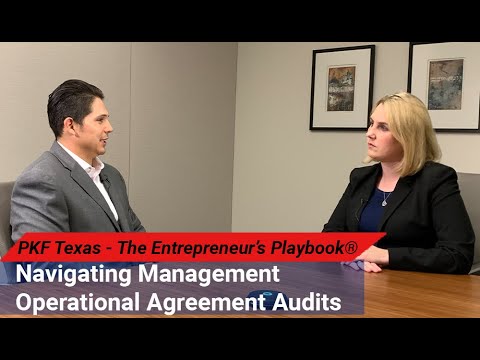Navigating Management Operational Agreement Audits

Jen: This is The PKF Texas Entrepreneur’s Playbook. I’m Jen Lemanski, and I’m back again with Carlos Gomez, an Audit Manager and one of the faces of our PKF Texas Contract Compliance Services team. Carlos, welcome back to the Playbook.
Carlos: Hi, Jen.
Jen: Can you give me a little bit of background – what is a management or an operational agreement audit?
Carlos: What these typically entail is we have a client who has a third party that manages – whether it’s residential or commercial buildings – for them and their tenants.
Jen: What types of things are involved in this audit? Are there any risks associated with doing this type of audit?
Carlos: There are significant risks, because, basically, the third party is responsible for collecting the revenue and passing along your share, and then taking certain deductions, whether it be expenses for their operations and what becomes before share, after share and those types of things. And then there are certain cases as well where a third party may have an affiliate that does certain work, and whether that’s a pass through or not can sometimes be blurry based on the agreement language.
Jen: So, when would we come into this process?
Carlos: Usually, the best time could be at the beginning, where we can help consult and get preferential terms for our clients or three to five years down the road when it’s a little more economically feasible. Our fees are never going to exceed, you know, the recovery that we can get, but typically within this industry, you can see 10% or more recovery on certain amounts that are reported to you.
Jen: And which side do we typically, out of the three parties, which side do we typically represent?
Carlos: We typically represent the person who owns a property – not the manager or the operational person. We can, when they need to help, but usually our clients have a portfolio of residents and people who run those properties for them.
Jen: Perfect, and I said “represent”—we’re not attorneys, so what is our role then?
Carlos: Good thing about consulting services is you can be a little bit more courteous with those types of terms, and so, representing them in an audit or, you know, in negotiations and things like that is a little more substantial and okay to say. We still don’t break the independence, because we are just making recommendations for management’s decisions.
Jen: Perfect. Well, I know this is a complex world, and we will get you back to talk a little bit more about some other topics. Sound good?
Carlos: Yes, ma’am.
Jen: For more information about this topic, visit PKFTexas.com/ContractCompliance. This has been another thought leader production brought to you by PKF Texas – The Entrepreneurs Playbook. Tune in next week for another chapter.

